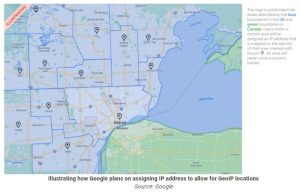Google plans to test a new feature called “IP Protection” for Chrome. This feature will improve users’ privacy by masking their IP addresses with proxy servers. Google wants to address the possibility of IP addresses being used for covert tracking, while still maintaining the necessary functions of the web.
IP addresses help websites and online services keep track of activities on different websites. This makes it easier to create user profiles that last for a long time. However, this raises privacy concerns because users don’t currently have a way to avoid being covertly tracked, unlike with third-party cookies.
What is Google’s proposed IP Protection feature?
IP addresses can be used to track and locate users. However, they are also necessary for important web functions such as directing traffic and preventing fraud.
The “IP Protection” solution hides users’ IP addresses from certain domains by using proxies. It will continue to adapt and protect users from cross-site tracking as the ecosystem changes. More domains will also be added to the proxied traffic.
“Chrome is reintroducing a proposal to protect users against cross-site tracking via IP addresses. This proposal is a privacy proxy that anonymizes IP addresses for qualifying traffic as described above,” reads a description of the IP Protection feature.
Initially, IP Protection will be an opt-in feature, ensuring users have control over their privacy and letting Google monitor behavior trends.
The feature’s introduction will be in stages to accommodate regional considerations and ensure a learning curve.
Only the listed domains will be affected in third-party contexts, focusing on those that are perceived to be tracking users.
Google’s first phase, called “Phase 0,” involves using a special proxy to redirect requests to its own domains. This is done to test the infrastructure of the system and to give Google more time to improve the list of domains.
To start, only users logged into Google Chrome and with US-based IPs can access these proxies. Some clients will be included in the preliminary test, but the architecture and design may change during the tests.
To prevent abuse, Google’s authentication server will give access tokens to the proxy server and set a limit for each user. In upcoming phases, Google plans to adopt a 2-hop proxy system to increase privacy further.
“We are considering using 2 hops for improved privacy. A second proxy would be run by an external CDN, while Google runs the first hop,” explains the IP Protection explainer document.
“This ensures that neither proxy can see both the client IP address and the destination. CONNECT & CONNECT-UDP support chaining of proxies.”
As many online services utilize GeoIP to determine a users’ location for service offerings, Google aims to assign proxy IP addresses representing a generalized user location, rather than their exact location, as depicted below.

Among the domains where Google intends to test this feature are its own platforms like Gmail and AdServices.
Google plans on testing this feature between Chrome 119 and Chrome 225.
Potential security concerns
Google states there are cyber threats associated with the new IP Protection feature.
Proxying traffic through Google’s servers may complicate blocking DDoS attacks and identifying invalid traffic.
If a hacker gains control of one of Google’s proxy servers, they can view and manipulate the traffic passing through it.
Google is considering implementing several measures to address these concerns. One measure is to require users to authenticate with the proxy, which would prevent proxies from connecting web requests to specific accounts. Another measure is to introduce rate-limiting to prevent DDoS attacks.
 InfoSecBulletin Cybersecurity for mankind
InfoSecBulletin Cybersecurity for mankind














